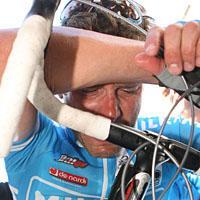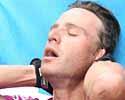News Feature, May 9, 2008
Innocently Guilty – the Petacchi case
If Alessandro Petacchi is asking the question, "why me?", it would not be surprising. The Milram sprinter drew a one-year sanction for taking too much of an asthma medication he was allowed to use, while other riders have escaped punishment for the same offense. Cyclingnews' Susan Westemeyer digs through the 28 page arbitration decision to find out why.
 |
Alessandro Petacchi "is not a cheat," the Court of Arbitration for Sport stated this week after ruling that the Italian must serve a one-year suspension. It found that his positive doping test during the 2007 Giro d'Italia was "the result of Mr. Petacchi simply, and, possibly, accidentally, taking too much Salbutamol on the day of the test, but that the overdose was not taken with the intention of enhancing his performance." Nevertheless, even though he was allowed by the UCI to use the drug, he was responsible for taking too much and the CAS decided that this warranted a sanction.
The case parallels that of Leonardo Piepoli, who tested positive for the same drug on the same day, and had almost half again as much of the drug in his system but escaped sanction. The only difference is Piepoli holds a racing license from Monaco, while Petacchi's is from his native Italy. And while the Italian Cycling Federation was happy to let the star go with a warning, the Olympic Committee (CONI) was keen to pursue the matter until 'Ale-Jet' went down.
How it unfolded
The story started on May 23, 2007, the 11th stage of the Giro d'Italia, 198 kilometres from Serravalle Scrivia to Pinerolo. It ended in the expected mass sprint, and Team Milram's Petacchi used his unbeatable speed to take his third win of the race and his 22nd career Giro stage win. It was a hot and humid day, and the asthmatic Petacchi was suffering from the weather.
To combat his exercise-induced asthma, the Italian had an Abbreviated Therapeutic Use Exemption (ATUE) from the UCI, which allowed him to take three doses of 200 mcg of Salbutamol by inhalation each day, and three doses of 0.5 mcg of Betamethasone by aerosol. His medical prescription was for a product called Ventolin, which contains Salbutamol, to be used three times a day. Each puff from the inhaler contains 100 mcg of Salbutamol, so he was allowed six puffs a day, to reach his total of 600 mcg.
On May 23, Petacchi told the CAS, he took two puffs from his inhaler before the race, two during the race and two or three after the race. Because he won the stage, he had to undergo a doping control. The resulting urine sample was tested at the WADA laboratory in Rome, and on May 26, the lab issued its finding that the sample contained 1352 ng/ml Salbutamol. The legal limit is 1000 ng/ml for athletes with a TUE.
At the UCI's request, the Rome lab sent the rest of the sample to the anti-doping lab in Barcelona, which conducted a further test to determine whether the Salbutamol had been ingested or inhaled. On June 21, the Barcelona lab issued its findings, saying the results "were not compatible with an inhaled therapeutic dose of salbutamol." The UCI informed the Italian cycling federation (FCI), which opened an investigation.
"Mr. Petacchi simply, and, possibly, accidentally, [took] too much Salbutamol on the day of the test, but ... the overdose was not taken with the intention of enhancing his performance."- The Court of Arbitration for Sport found Petacchi at fault for his positive test. |
Meanwhile, the Gazzetta dello Sport reported on June 13 that three riders had tested "non-negative" in the Giro, and the names were released the next day. Petacchi was informed of the findings on June 27, and he waived his right to have the B-sample tested. Team Milram suspended him the next day, pending the results of the on-going investigation.
Doping cases in Italy are prosecuted by the antidoping committee of the Italian Olympic Committee (UPA-CONI), and this case was heard by the disciplinary committee of the Federazione Ciclistica Italiana (FCI, Italian Cycling Federation) on July 24. In a quick action, the decision was issued on the same day – a decision that Petacchi "was found not to have been in breach of the anti-doping rules." "It's one of the most beautiful wins in my life," Petacchi said. "I don't wish anybody to suffer like I did, it was the worst experience of my life."
He returned to racing, and was as successful as ever, winning, among others, two stages in the Vuelta a Espana and closing out his season with a win in the ProTour race Paris-Tours on October 14.
The CONI appealed the decision to the Court of Arbitration for Sport, and the hearing was eventually held on April 2. Petacchi meanwhile continued to ride, and continued to win, racking up five wins by the middle of March. Then came Milano-Sanremo, during which he started feeling unwell. He was sick in bed, taking antibiotics but recovered to ride the Tour of Turkey, where he won two stages.
But he took more home with than just honour and trophies – he also caught bronchitis, which turned out to be a severe tracheobronchitis with bronchial spasms. Although he started feeling better, he was forced to announce that he would not be able to ride this year's Giro d'Italia, exactly one week before its start.
However, he would have been unable to start even if he had been healthy. The CAS issued its ruling on Tuesday, May 6th, giving him a one-year suspension which ends August 31, 2008.
The ruling
 |
At the April 2 hearing, Petacchi had argued that as an asthmatic, he needed to use his inhaler more than usual on the hot and humid day during the Giro. "Unusually Mr. Petacchi had felt the need to use the inhaler after the race, only an hour before he gave his sample," the decision summarized the rider's argument. "The use after the race and shortly before he gave his sample" were allegedly the cause of the high concentration. In addition, he argued, he "may have used a sub-optimal inhalation technique" when he used the inhaler during the race and may have inadvertently swallowed some of the medication.
The CAS panel accepted most of these arguments, but still found him guilty. Petacchi did not show that the 1352 ng/ml concentration of Salbutamol was within the legal limits. "The Panel is not satisfied, on the basis of probabilities, that result was the consequence of him inhaling Salbutamol in accordance with his ATUE."
However, it accepted his explanation that the high concentration of Salbutamol "was that he took too many puffs of his Ventolin inhaler on that day, including some after the race," It also noted that "Mr. Petacchi accepts that he may not have complied precisely with the authorised dose of 600 mcg," as well as the fact that some of the puffs were taken only an hour before the doping control.
"Mr. Petacchi's fault can be characterised as administering an excess of therapy by taking more than six puffs of Ventolin," he panel found. "As an additional relevant circumstance, the Panel notes that Mr. Petacchi states that he took 2-3 puffs after the race which could support a view that Mr. Petacchi had, in taking the puffs, no intention to enhance his performance."
This turned out to be a major point in the Panel's decision to suspend him for only one year. "The Panel is satisfied that Mr. Petacchi is not a cheat, and that the adverse analytical finding in this case is the result of Mr. Petacchi simply, and, possibly, accidentally, taking too much Salbutamol on the day of the test, but that the overdose was not taken with the intention of enhancing his performance."
The panel emphasized this point again. "Indeed, it would be an unusual way of attempting to take the prohibited substance after the particular event had concluded."
The decision then turned to the legal distinction between "No Significant Fault or Negligence" and "No Fault or Negligence," finding him innocent of the first but guilty of the second. He had "No Significant Fault or Negligence," it ruled, "because his fault or negligence, when viewed in all the circumstances and taking into account the criteria for no fault or negligence, was not significant in relation to this anti-doping rule violation.." This allowed the panel to reduce the suspension to one year.
The panel further noted that it had been suggested that Petacchi should be found to have "No Fault or Negligence," which would have meant no suspension. "However, as the panel has made clear, it has concluded that Mr. Petacchi took too much Salbutamol. In order to establish No Fault or Negligence an athlete has to show that he has used the 'utmost caution'. Even on his own account, Mr. Petacchi took more than the authorised dose. He cannot establish that he used the utmost caution."
In other words, the CAS concluded that Petacchi inadvertently took too much of an otherwise illegal product, which he was allowed to used in limited quantities. He went over his limit, but not for the purpose of enhancing his performance, it found – making this quasi a "non-doping" doping case. However, whatever the cause, he was found to have an illegal quantity in his urine sample, which is a violation of doping rules.
What ultimately led to his conviction and suspension was Article 15 (1.1) of the UCI and WADA's Anti-Doping Regulations, which reads in part:
"It is each Rider's personal duty to ensure that no Prohibited Substance enters his body.
Riders are responsible for any Prohibited Substance or its Metabolites or Markers found to be present in their bodily Specimens. Accordingly, it is not necessary that intent, fault, negligence or knowing Use on the Rider's part be demonstrated in order to establish an anti-doping violation under Article 15.1."
The sanctions
Having ruled that Petacchi had violated the anti-doping rules, the panel then turned to the question of sanctions. For the reasons stated above, it awarded only a one-year suspension instead of two years. Two months of the sentence were suspended, "to take into account the two month period when Mr. Petacchi was not competing in competitions."
How the panel arrived at this two month period is unclear. The panel's press release states "that A. Petacchi did not race between the day of the doping control and the date of the decision of the FCI," that is, between May 23 and July 24. That is, however, not the case. Petacchi continued to ride in the Giro after the doping control, in fact winning two more stages. He also rode in Veenendaal – Veenendaal on June 13th and Delta Profronde June 14, before Team Milram suspended him on June 28. After the FCI's decision the end of July, he started racing again, with his first appearance being in the Rund um die Hainleit on August 4. Presumably the two month period was counted from the end of the Giro d'Italia on June 3 to when he resumed racing on August 4, and ignores the races he participated in before being notified of his positive result.
The panel allowed him to "retain all competitive results between 23 May 2007 and 31 October 2007." That includes, among others, the two Vuelta a Espana stage wins and Paris-Tours.
Explicitly excluded from that, however, is the Giro. All results from the 2007 Giro and in races this season are also now forfeited, and his name is to be removed as winner. The panel specifically mentions for the Giro that he most forfeit "any medals, points and prizes", which likely includes the financial rewards.
The future
 |
Petacchi's future remains unclear. He had indicated that he might retire if he was given a suspension, but the mildness of the decision and sanction may change his mind. He turned 34 at the begriming of this year, and judging by his (now forfeited) results for this season, is showing no signs of slowing down. If he is released by Milram, it seems likely he would have no trouble finding a new team to ride for when his sanction ends on September 1.
Much depends on the actions of Team Milram, which must now decide what to do. The team was battered last season by doping news, ranging from Erik Zabel's confession to having used EPO in the 1990s to Pettachi's "non-negative" test. It was all topped by Jörg Jaksche blaming then-team manager Gianluigi Stanga for having introduced him to doping, also in the 1990s.
The sponsor stepped in over the summer and took action. Stanga was replaced as manager by Gerry van Gerwen, who had been the business manager, and who also took over the ProTour license. The new ProTour license also identified Milram as a German team for the first time.
At the team's presentation in January, van Gerwen laid great emphasis on the team's anti-doping programme, stating categorically, ""An immediate suspension in case of a doping suspicion and an immediate dismissal in case of a confirmed doping case."
It looks like a no-win situation for Milram. Petacchi is now "a confirmed doping case," and in keeping with its strict anti-doping policy, the team should let him go, thereby losing the rider who has brought in the vast majority of its wins over the last two-plus seasons. It could also thereby reap negative public opinion for firing him over a "non-doping" doping case.
On the other hand, if the team decided not to fire him, but to punish him in other ways – a fine, or donation to a good cause, for example – and then allow him to ride again, it would face a firestorm of public opinion for not abiding by its own stated anti-doping policy.
The team is expected to make its announcement within the next few days.

